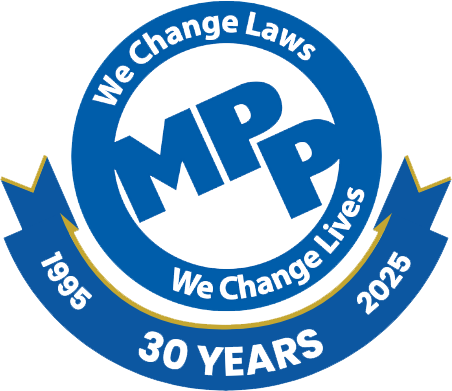- Take Action: Urge your state legislators to support a compassionate medical cannabis program!
Select a State
- Alabama
- Alaska
- Arizona
- Arkansas
- California
- Colorado
- Connecticut
- Delaware
- District of Columbia
- Florida
- Georgia
- Hawaii
- Idaho
- Illinois
- Indiana
- Iowa
- Kansas
- Kentucky
- Louisiana
- Maine
- Maryland
- Massachusetts
- Michigan
- Minnesota
- Mississippi
- Missouri
- Montana
- Nebraska
- Nevada
- New Hampshire
- New Jersey
- New Mexico
- New York
- North Carolina
- North Dakota
- Ohio
- Oklahoma
- Oregon
- Pennsylvania
- Rhode Island
- South Carolina
- South Dakota
- Tennessee
- Texas
- Utah
- Vermont
- Virginia
- Washington
- West Virginia
- Wisconsin
- Wyoming
Menu
In the Media
- Newsroom
- In the Media
Mar 23, 2022
Decriminalizing Marijuana in the 70s? (VIDEO)
On the 50th anniversary of the Shafer Commission report, which recommended decriminalizing cannabis on the federal level, MPP's Southeast Legislative Manager Kevin Caldwell speaks to Isiah Carey about reasons why marijuana remains illegal.
Read more
Mar 22, 2022
Marijuana Policy Project names Pennsylvania one of 19 states with worst weed laws
"There’s still a ton of arrests happening for cannabis possession in Pennsylvania," said DeVaughn Ward, MPP's senior legislative counsel.
Read more
Mar 22, 2022
Policy group spotlights 19 US states where cannabis reform still lags
MPP’s report draws attention to states that similarly haven’t even decriminalized simple possession, examining continued racially disparate arrest rates and other consequences of draconian drug laws. “Not only are the cannabis policies in these states outdated, but they are also unjust and inhumane,” reads the report. “In some of these states, penalties are shockingly harsh.”
Read more
Mar 22, 2022
50 Years Ago Today, A Federal Panel Said Marijuana Should Be Decriminalized—But A President Who Ran On Reform Still Hasn’t Done It
In its report, MPP concludes by saying that, “Fifty years after the Shafer Commission recommended decriminalization, it is long past time for these states to start taking a more just, commonsense, and fiscally responsible approach to cannabis policy.”
Read more
Mar 17, 2022
States, flush with marijuana money, are now fighting over what to do with it
“It’s very important to do those things largely because of the toll that [drug arrests] took on those communities,” said Toi Hutchinson, president and CEO of the Marijuana Policy Project, a group that advocates for the legalization and equity of the cannabis business.
Read more
Mar 15, 2022
Rhode Island Senate Committee Discusses Marijuana Legalization Bill, With Advocates Urging Equity Revision
Jared Moffat, state campaigns manager for the Marijuana Policy Project, told lawmakers that “of the 18 states that have legalized cannabis, 11 of them have implemented a state-initiated record clearance process, and the policy has proven to be much more effective than a system that requires individuals to request that action be taken.”
Read more
Mar 10, 2022
Delaware Marijuana Legalization Bill Fails In House—Even Though Most Representatives Voted For It
"We’re disappointed HB 305 was not approved by the House today. Although far more representatives voted in favor than against the bill, it fell just two votes short of the needed supermajority. We will continue to fight to bring equitable legalization to Delaware," said Olivia Naugle, MPP's senior policy analyst.
Read more
Mar 10, 2022
Continues to Block D.C. Cannabis Sales Despite Democrat Majority
"We are very disappointed that Congress continues to prevent residents of D.C. from regulating cannabis despite their urgent and repeated requests for reform. Instead, Congress is forcing the District to maintain a gray market in which cannabis can be legally possessed and consumed by adults, but it cannot be legally sold, regulated, or tested. This places consumers at risk, and entrepreneurs who live in this minority-majority community are denied the ability to open businesses that are available in every other legal cannabis jurisdiction," said Toi Hutchinson, MPP's President and CEO.
Read more
Mar 08, 2022
Pot Industry Supports WNBA’s Griner After Russia Arrest
"While we don’t have direct knowledge of this particular situation, it is not uncommon for athletes to use these oils for their physical and mental health, and they should not be penalized or stigmatized for doing so. Simple cannabis possession should never be cause for international geopolitics, as we are seeing play out in this case. After weeks of detention amid an increasingly uncertain and dangerous political environment, Brittney needs to be safely returned home as soon as humanly possible," said Toi Hutchinson, MPP's President and CEO.
Read more
Mar 04, 2022
Proposed Legislation Seeks to End Criminalization of Cannabis
"I was on probation for a year over a nickel bag. Fortunately, I am here and working for the Marijuana Policy Project to stop this criminalization of marijuana and fight for equitable and inclusive policies for this industry," said Tahir Johnson, MPP's director of social equity and inclusion.
Read more









